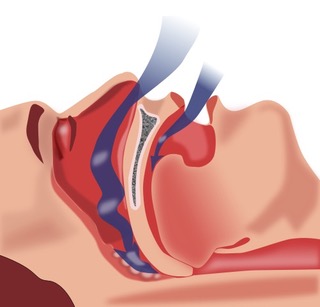Exercise throat muscles for snoring with Hashimoto’s

Snoring happens when the tissues and muscles become too “floppy” during sleep and vibrate. Researchers found simply exercising those muscles to maintain their tone can help reduce snoring.
Some people with Hashimoto’s hypothyroidism also experience snoring due to swelling of the thyroid in the neck and increased weight gain from low metabolism, so managing your autoimmune thyroid condition is also an important strategy for snoring.
In a 2015 study, researchers looked at groups of men and women who did not have obstructive sleep apnea, which is associated with many health risks, but snored due to mild or moderate sleep apnea.
For the study, all the participants were instructed to irrigate their nasal passages (such as with a neti pot) three times a day to rule out nasal blockage as a cause of snoring. (Sinus infections also cause snoring and regular nasal irrigation can help combat this.)
Then the subjects were divided into two groups. One group used nasal strips and deep breathing exercises to address their snoring.
The other group performed 8 minutes of tongue and palate exercises three times a day.
At the end of the three-month study, only the group who performed the exercises saw a difference in their snoring — and it was a significant difference.
The exercise group saw the frequency of nightly snoring drop by the 36 percent and the intensity of sound by 59 percent.
This explains why people who regularly sing, play horn instruments, and even play the didgeridoo also report fewer problems with snoring.
For those with Hashimoto’s hypothyroidism, using functional medicine strategies to manage your autoimmune thyroid condition are additionally a vital piece of the puzzle to reducing the severity of snoring and sleep apnea.
Throat and palate exercises to reduce snoring
In addition to managing your Hashimoto’s hypothyroid condition, you can also directly begin exercising the areas of the upper airways to reduce snoring.
As with any exercise, the key is to stick with it and keep up the frequency. You’ll also need to perform these on a long term basis for the benefits. Add the exercisesto your commute, tooth brushing routine, or along with your morning cup of coffee. Your bed partner will thank you and you may experience feeling more rested and energetic during the day.
- Push the tip of your tongue against the roof of your mouth and slide it backward 20 times.
- Suck your tongue upward against the roof of your mouth 20 times.
- Push the back of your tongue down while keeping the tip touching the inside of your front teeth 20 times.
- Lift your soft palate and uvula 20 times.
- Using your index finger, press the inside of your cheek muscle away from your teeth 10 times on each side.
- When you’re eating, bite down, then lift your tongue to the roof of your mouth as you swallow, without tightening your cheek muscles.
Midlife hormones, inflammation, and snoring
Although nasal congestion and obesity can cause snoring, many people notice their snoring kicked in during midlife.
Some research shows this is due to a decline in reproductive hormones — estrogen in women and testosterone in men. These hormones play a role in the part of the brain responsible for throat and palate muscle tone during sleep.
Many people with Hashimoto’s hypothyroidism also struggle with hormone imbalances and deficiencies due to an overall imbalance in the metabolic system.
Restoring balance to the hormones is important not only for helping reduce snoring severity, but also for better managing Hashimoto’s hypothyroidism.
Inflammation of the upper airways have also been shown to increase snoring. Adopting an anti-inflammatory diet may help reduce swelling in those tissues and reduce snoring.
Managing inflammation is a vital component to managing Hashimoto’s hypothyroidism. An unmanaged autoimmune thyroid condition leads to unchecked inflammation throughout the body.
Ask my office about maintaining healthy hormone levels, reducing inflammation, and managing your autoimmune Hashimoto’s hypothyroidism disorder through nutritional and lifestyle means.